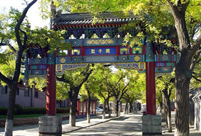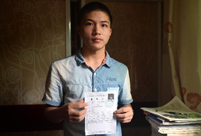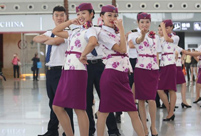 Post-90s beauty boxer grapples four men
Post-90s beauty boxer grapples four men
 3,000-year-old tea town through lenses
3,000-year-old tea town through lenses
 22 archaeological sites along Silk Road in China
22 archaeological sites along Silk Road in China
 Football babies, Samba dancers embrace 'World Cup'
Football babies, Samba dancers embrace 'World Cup'
 Beautiful scenery along China’s Grand Canal
Beautiful scenery along China’s Grand Canal
 High speed train attendants receive training in Chongqing
High speed train attendants receive training in Chongqing
 Rare rainbow clouds seen in Fujian
Rare rainbow clouds seen in Fujian
 Small bracelet going global
Small bracelet going global
 Aerial Photography: Amazing Tianshan Mountains
Aerial Photography: Amazing Tianshan Mountains
 'Animals' in 2014 World Cup
'Animals' in 2014 World Cup
More support and training offered to countries in Africa, Europe
China, the largest contributor of personnel to United Nations peacekeeping, will provide more expertise and training to fight cross-border crime on top of its traditional role of maintaining order and security.
The country will facilitate training for foreign police officers and send more instructors and technical experts to help with security for large-scale activities, criminal investigation techniques, entry and exit management, cybersecurity, and anti-explosive and anti-terrorist activity, Yang Shaowen, deputy director of the International Cooperation Bureau of the Ministry of Public Security, said on Sunday.
"To further help UN peacekeeping efforts, we plan to deploy more police personnel to some African and European countries, such as Cyprus, to provide skills training for local police and to improve their combat capabilities," Yang told China Daily.
Cui Zhikun, a director of the China Peacekeeping Police Training Center, said the country has invested 400 million yuan ($64.5 million) in a training base in Langfang, Hebei province, for peacekeeping police officers.
Each officer receives a minimum of three months' special training before being posted overseas. So far, 1,400 foreign police officers have been trained at the base.
The country's latest contribution to help fight cross-border crime comes amid the increasing threat of transnational organized criminal activity, including drug and arms smuggling, cybercrime, human trafficking, and sexual and gender-based violence.
Dmitry Titov, an assistant secretary-general at the UN, said that of the five permanent members of the UN Security Council, China provides the highest number of peacekeeping troops and police.
"Currently, we are working in environments with asymmetric and unconventional threats - including sectarian divisions, piracy and social tension," he said. "Peacekeeping will need to be more mobile, more flexible and adaptable."
China will play a more active role in offering special training, experts, criminal investigation techniques and funding to countries in need, he said.
Liao Jinrong, director of the Ministry of Public Security's International Cooperation Bureau, said that since 2000, China has sent 2,032 peacekeeping police to eight countries and regions including Kosovo, Liberia, Afghanistan, Haiti and Sudan.
On Tuesday, China will deploy a second police unit comprising 140 police officers to Liberia to continue an eight-month peacekeeping mission, while the first group of troops who were deployed in October will complete their duty and return home on July 3, Liao said.
Liao acknowledged that practical challenges facing the peacekeeping operations include infectious diseases and criminal attacks that can threaten the life and safety of the Chinese officers.
"The UN should take effective measures to maximize resources, increase training safety, improve the living conditions of camps and enhance vehicular support to help reduce security risks," he said.
 Featured hutongs in Beijing
Featured hutongs in Beijing Separate college entrance exam
Separate college entrance exam Flash mob dance
Flash mob dance Picturesque scenery of Ghost City
Picturesque scenery of Ghost City Children attend First Writing Ceremony
Children attend First Writing Ceremony Female master poses for graduation photos with son
Female master poses for graduation photos with son Silk Road, China's Grand Canal listed as World Heritage Sites
Silk Road, China's Grand Canal listed as World Heritage Sites PKU students imitate famous paintings in real-person photos
PKU students imitate famous paintings in real-person photos Chinese 'Slumdog Millionaire'
Chinese 'Slumdog Millionaire' Islands in S. China Sea better shown on new vertical atlas of China
Islands in S. China Sea better shown on new vertical atlas of China Girl takes father’s portrait to travel the world
Girl takes father’s portrait to travel the world Images of Xi'an: Part one
Images of Xi'an: Part one In Pictures: Female fans of World Cup
In Pictures: Female fans of World Cup Top 20 hottest women in the world in 2014
Top 20 hottest women in the world in 2014  China's top 10 representative architectures
China's top 10 representative architecturesDay|Week|Month